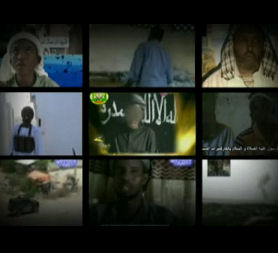Somalia: the new Pakistan for terror recruitment?
An investigation for Channel 4 News reveals the story of a suicide bomber who grew up in Ealing before travelling to Somalia. Jonathan Rugman follows the path taken by newly radicalised youths.
“Pakistan rightly gets the most attention in terms of external threats,” a senior counter-terrorism source told Channel 4 News in February 2009.
“But we believe we should focus more on the Horn of Africa and Somalia in particular.”
In 2007 Ethiopian forces occupied parts of Somalia after ousting the Union of Islamic Courts (UIC) from the capital, Mogadishu – the latest chapter in a long history of conflict between the two countries.
The Ethiopians withdrew last month as part of a peace deal agreed between the government and moderate Islamists, leaving African Union peacekeepers and Somali soldiers – although many believe that they will not be able to keep advancing extremists at bay.

The hardline Islamist militia al-Shabaab, which is labelled as a terrorist organisation by the US, has taken advantage of Ethiopia’s pull-out to boost its control of the south. More than 16,000 people have been reported killed in the past two years of fighting and one UNHCR official has called it “the most pressing humanitarian emergency in the world”.
Peter Neumann, a terrorism expert who runs the Centre for the Study of Radicalisation at King’s College London, told Channel 4 News: “The numbers I hear going from the UK to Somalia are 50, 60 or 70, but in reality we don’t know. You don’t need big numbers for terrorism.
An audio message from Osama bin Laden in 2009 urged Muslims to send money or go to fight themselves in Somalia.
Somalia will never become another Pakistan, but that does not mean it is not a threat.”
Most Somalis in Britain entered the country as asylum-seekers within the past 20 years. They include Yasin Omar and Ramzi Mohammed, two of the four men convicted of the botched bombing of the London Underground on 21 July 2005.
An audio message from Osama bin Laden in 2009 urged Muslims to send money or go to fight themselves in Somalia.
“Such references are usually a good indicator,” Dr Neumann said. “The place is seen as an opportunity, from a jihadist point of view.”

From business student to suicide bomber
The British Somali who became a suicide bomber had abandoned a business studies course at Oxford Brookes University.
The 21-year-old from Ealing, West London, reportedly blew himself up at a checkpoint in the southern Somali town of Baidoa in October 2007 after crossing into Somalia by foot from Kenya.
News reports at the time said that the Somali prime minister was staying at a nearby hotel but escaped. Somali jihadist websites claimed that more than 20 Ethiopian soldiers were killed.
The bomber was a member of al-Shabaab - The Youth - militia, which is fighting to impose Islamic law. Its brutal tactics include decapitating alleged spies with knives. Six aid workers were reportedly killed by the group last December.
It is not clear whether Britain's security services are aware of the Ealing student's case. His family, who still live in London, want his name withheld to avoid reprisals.
The man had recorded a martyrdom video in which he urged Somalia's refugee diaspora to join him in his jihad.
"Oh my people, know that I am doing this martyrdom operation for the sake of Allah," he said. "I advise you to migrate to Somalia and wage war against your enemies. Death in honour is better than life in humiliation."
Sheikh Ahmed Aabi, a moderate Somali religious leader in Kentish Town, northwest London, said that he knew of the Ealing case and had heard from other families of sons travelling to Somalia to join warring Islamist groups.
"I'm hearing it from parents," he said. "They say they [their children] are joining the jihad. I am hearing there are a lot of people. This is a big problem facing our community."
The Home Office has said it is working with groups “including the Somali community, to tackle a growing concern that our young people are being radicalised into violent extremism”.
However, some Somali leaders say their community – already associated with gang and knife crime – is being unfairly targeted. They say they are entitled to fight for their homeland.
Somalia – an “ungoverned space”.
“If American troops can go from Arizona to Iraq then someone can leave this area and go to Somalia,” one told Channel 4 News.
A senior counter-terrorist source said that while Ethiopia’s withdrawal could lessen the immediate appeal of going to fight, it could also “create more space for terrorism training camps”.
Another described the country as an “ungoverned space” that resembled Afghanistan under the Taliban.
-
Latest news
-
‘It was hard not to laugh on set’ – Swede Caroline lead on root vegetable mockumentary5m

-
Teachers to be allowed guns in Tennessee schools5m

-
Tory MP defects to Labour over NHS ‘chaos’2m

-
Al Sharpton on US campus wars and the US election race between ‘two old white men’5m

-
Israel-Gaza war continues to fuel protests and division in US, France and UK4m

-




